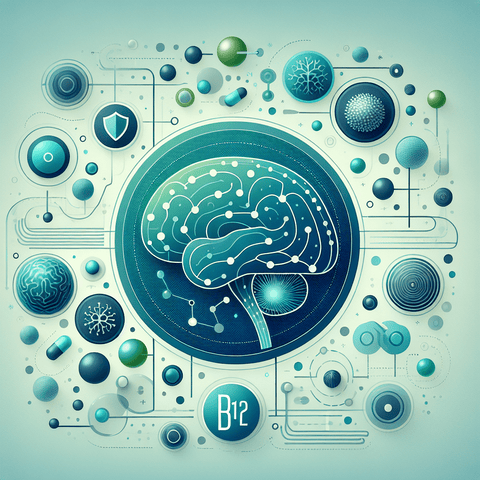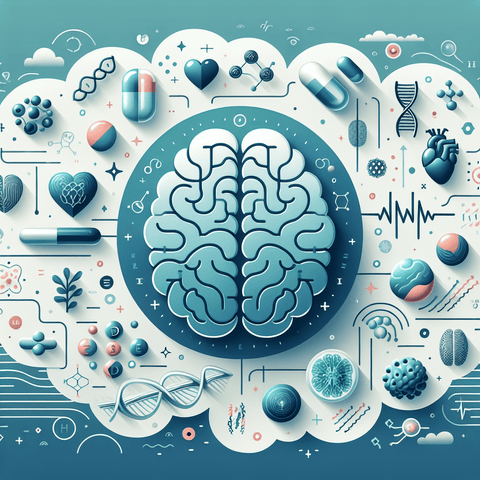Introduction
In today’s fast-paced world, mental agility and resilience are more important than ever. Whether you're a student mastering complex subjects, a professional managing high-pressure tasks, or simply someone striving to maintain optimal cognitive function, supporting brain health is essential. As research advances, it becomes clear that nutrition plays a pivotal role in safeguarding and enhancing mental performance. Among various nutrients, vitamins, minerals, and fatty acids are critically examined for their potential to boost cognition. In particular, nutritional supplements have gained popularity as accessible tools to support brain health and brain resilience. They offer a practical approach for individuals seeking to bridge nutritional gaps or optimize mental performance. From omega-3 fatty acids to antioxidants, there are numerous options available. However, one nutrient consistently proven to be fundamental for neural function is Vitamin B12. Vitamin B12, also known as cobalamin, is vital for maintaining the integrity of the nervous system and supporting metabolic processes that underpin mental clarity, focus, and resilience. This comprehensive guide explores how Vitamin B12 can significantly impact your brain power and cognitive resilience, offering insights into its biological functions, benefits, and practical ways to incorporate it into your health routine. Discover how optimizing your B12 levels can help you maintain a sharper mind, improve memory, and promote lasting neurological health.
Vitamin B12: A Critical Nutrient for Brain and Nervous System Support
Vitamin B12 is a water-soluble vitamin essential for numerous physiological processes, especially those related to the nervous system and DNA synthesis. It is naturally found in animal-based foods such as eggs, meat, dairy, and fish, making it a critical nutrient for those on omnivorous diets. Its chemical structure allows it to act as a cofactor in key enzymatic reactions involved in cell metabolism, DNA replication, and neurological function. Biologically, Vitamin B12 plays an integral role in the synthesis of neurotransmitters—chemical messengers that facilitate communication between nerve cells. Neurotransmitters such as serotonin, dopamine, and norepinephrine require B12-dependent reactions for their production. These chemicals are crucial for mood regulation, cognitive processes, and overall mental well-being. Furthermore, B12 is essential for maintaining the integrity of myelin sheaths—protective coverings that insulate nerve fibers and ensure rapid, efficient nerve impulses. A deficiency in B12 can lead to disrupted nerve signaling, resulting in neurological symptoms like numbness, tingling sensations, cognitive impairment, and even nerve degeneration in severe cases. Research indicates that suboptimal B12 levels correlate with poorer cognitive performance and increased risk of developing neurodegenerative conditions such as Alzheimer’s disease. Supporting this, studies have shown that maintaining adequate B12 levels correlates with improved cognitive functioning, especially in aging populations. The importance of ensuring sufficient B12 intake is especially prominent for vegans and vegetarians, who often have limited access to natural dietary sources. In such cases, supplementation or fortified foods become invaluable. To support overall neurological resilience, it’s critical to maintain optimal B12 levels through diet or supplements. For those interested in supplement options, high-quality B12 supplements are readily available at topvitamine.com, ensuring reliable sources of this vital nutrient.
Boost Your Brain Power: How B12 Enhances Cognitive Function Support
Numerous studies underline the positive impact of Vitamin B12 on cognitive functions. Key areas influenced by B12 include concentration, problem-solving, mental clarity, and learning ability. Supplementing with B12 has been linked with enhanced performance in tasks requiring attention and memory retention, making it a valuable nutrient for individuals seeking mental sharpness. Neuroscientific research suggests that B12 contributes to neural plasticity—a capacity of the brain to adapt and form new neural connections. This plasticity is vital for learning new skills and maintaining cognitive flexibility throughout life. B12 also supports synaptic integrity—the connections between neurons that allow information transfer. Healthy synaptic function is crucial for efficient brain signaling and overall mental resilience. Practical application of B12 for cognitive support involves incorporating supplements into daily routines, especially for those with identified deficiencies or at risk. To optimize cognitive benefits, many practitioners recommend B12 supplements in sublingual forms, injections, or fortified foods, depending on individual needs. Testimonials and case studies reinforce these benefits. Many individuals report increased alertness, improved focus, and reduction in mental fatigue after integrating B12 into their wellness regimen. For example, working professionals and students have observed noticeable improvements in their ability to concentrate on complex tasks and retain information more effectively. By integrating B12-rich foods or supplements into your lifestyle, you can support your brain’s capacity for cognition and learning. Additionally, pairing B12 with other cognitive-supporting nutrients—such as Vitamin D, Omega-3 fatty acids (DHA & EPA), and Magnesium—can provide synergistic effects. Explore [DHA/EPA Omega-3 Supplements](https://www.topvitamine.com/collections/dha-epa-omega-3-supplements) for complementary support. Remember, consistent intake tailored to your individual needs is key. Consulting a healthcare provider can help determine the optimal dosage and form of B12 to best support your mental performance and long-term cognitive resilience.
Supporting Neurological Health: The Protective Role of Vitamin B12 in Neural Integrity
Beyond immediate cognitive functions, Vitamin B12 plays a pivotal role in the structural health and integrity of the nervous system. A fundamental aspect of this is its involvement in myelin sheath formation and maintenance—the fatty layer that insulates nerve fibers, enabling quick and efficient nerve impulse transmission. The process of myelination, crucial during brain development and throughout life, depends on sufficient B12 levels. If B12 is deficient, myelin formation can be compromised, leading to neurodegeneration and neurological deficits. This vulnerability underscores the importance of adequate B12 intake not just for cognition but also for overall neural integrity. Research links low B12 levels with neurodegenerative disorders such as Alzheimer’s and Parkinson’s disease. Although these conditions are multifactorial, maintaining appropriate B12 levels may mitigate some risks or slow disease progression by preserving neural structure and function. B12 also helps prevent nerve damage caused by oxidative stress and inflammation—factors involved in many neurological disorders. Furthermore, it supports nerve regeneration after injury, promoting recovery and resilience in neural tissues. For early intervention, addressing subclinical B12 deficiency before significant neurological damage occurs is critical. Regular screening and ensuring ongoing supplementation in at-risk populations—such as older adults, vegans, and those with gastrointestinal absorption issues—can help sustain neural integrity over time. Ensuring continued B12 intake supports a resilient nervous system capable of defending against degeneration and trauma. To enhance neurological health, consider integrating B12 supplements along with lifestyle practices such as physical exercise and mental stimulation. For comprehensive support, combining B12 with other nutrients like Vitamin D and Magnesium creates an environment conducive to nervous system vitality. Explore [Magnesium Benefits](https://www.topvitamine.com/collections/magnesium-benefits-energy-muscle-bone-support) for additional help in supporting nerve health.
Memory Improvement through Vitamin B12 Supplementation
Memory is a fundamental cognitive function that allows us to process, store, and retrieve information efficiently. As we age or face nutritional deficiencies, memory performance can decline. One of the key nutrients associated with sustaining memory function is Vitamin B12. Scientific studies demonstrate that B12 deficiency correlates with impaired memory and cognitive decline, particularly among older adults. The deficiency affects the synthesis of neurotransmitters involved in memory pathways. Additionally, subclinical B12 deficiency can impair the hippocampus—the brain’s memory center—leading to forgetfulness and decreased learning capacity. Supplementing with B12 has shown promising results, especially when deficiency is corrected. Clinical trials indicate improvements in working memory, recall speed, and overall cognitive performance following B12 supplementation. It’s noteworthy that even in individuals with marginal B12 levels, supplementation can lead to measurable cognitive benefits. Common signs of B12 deficiency that may affect memory include difficulty concentrating, forgetfulness, confusion, and mental fatigue. Recognizing these early signs and addressing them with appropriate supplementation can preserve memory function. Dosage recommendations vary based on age, nutritional status, and specific health conditions. For older adults or those with diagnosed deficiency, higher doses of B12—such as injections or sublingual tablets—may be recommended to ensure absorption and efficacy. To promote memory health, integrating B12-rich foods, fortified products, or supplements from topvitamine.com specific to cognitive support can be highly beneficial. Proper dosage and consistent intake are essential to realize the full benefits for memory enhancement and cognitive resilience.
Enhancing Mental Clarity with Vitamin B12: Fostering Focus and Reducing Brain Fog
Experiencing mental fog, lack of focus, and fatigue can significantly impair daily life and productivity. Scientific evidence suggests that B12 deficiency is often a contributing factor in these issues, given its role in energy production and neural function. B12 facilitates the conversion of homocysteine to methionine—an amino acid involved in methylation processes critical for DNA synthesis and neurotransmitter production. Disruption of methylation can lead to cognitive sluggishness, mood disturbances, and decreased mental clarity. Additionally, low B12 levels have been associated with increased brain fog and fatigue, impacting concentration and motivation. Supplementing with B12 can help restore mental clarity, improve focus, and reduce feelings of exhaustion. Many individuals notice a notable difference within days to weeks after starting supplementation, especially if their baseline B12 levels were suboptimal. Lifestyle strategies to maximize mental clarity include maintaining consistent sleep patterns, managing stress levels, and engaging in mental exercises. Combining these practices with B12 supplementation creates a synergistic effect, further boosting cognitive performance. It’s worth considering the potential benefits of combining B12 with other brain-supporting nutrients such as Vitamin D and Omega-3 fatty acids. For example, [Vitamin D Benefits](https://www.topvitamine.com/collections/vitamin-d-benefits-sources-safety) and Omega-3s are well-documented for their roles in brain health and cognitive function. To achieve optimal mental clarity, evaluate your B12 status periodically and consider supplementation if needed. Many high-quality B12 supplements are designed for quick absorption, including sublingual tablets and injections, which bypass gastrointestinal barriers. Maintaining adequate B12 levels isn’t just about avoiding deficiency; it’s a proactive step toward sustained mental sharpness and resilience against cognitive fatigue.
Conclusion
Supporting brain health and cognitive resilience is a multifaceted endeavor, and Vitamin B12 stands out as a vital nutrient in this pursuit. Its crucial functions in neurotransmitter synthesis, myelin formation, and neural repair underscore its importance across various aspects of cognitive health, including memory, focus, and mental clarity. Maintaining adequate B12 levels can help prevent neurodegeneration, support neural plasticity, and foster an overall resilient brain capable of adapting to life's challenges. Incorporating B12-rich foods or high-quality supplements into your daily routine offers a practical path toward optimizing mental performance. Whether you're looking to boost concentration, safeguard memory, or protect against neurological decline, ensuring sufficient B12 intake is a fundamental step. For personalized recommendations, consulting with healthcare providers can help tailor supplementation strategies to your specific needs. Remember, supporting your brain health isn’t a one-time effort but a lifelong commitment to nourishing and protecting your most vital organ. With informed choices and consistent supplementation, you can enhance your cognitive resilience and enjoy a sharper, more vibrant mind for years to come.
Call to Action
Ready to take your cognitive health to the next level? Explore our selection of top quality Vitamin B12 supplements at topvitamine.com. Our products are designed to deliver reliable, effective support for your brain health needs. Additionally, schedule regular brain health check-ups and stay informed about your nutritional status to optimize your mental resilience. Don’t forget to subscribe to our blog for ongoing tips on nutritional strategies for cognitive enhancement and maintaining mental sharpness!
Q&A Section
Q1: How does Vitamin B12 affect brain health?
Vitamin B12 supports brain health by aiding in the synthesis of neurotransmitters, maintaining myelin sheaths around nerves, and supporting DNA synthesis. Adequate levels are crucial for cognitive functions such as memory, focus, and neural plasticity. Deficiencies can impair these functions and increase the risk of neurological issues.
Q2: What are the signs of B12 deficiency related to cognitive health?
Signs include forgetfulness, difficulty concentrating, mental fog, fatigue, and mood swings. Severe deficiency may lead to neurological damage, tingling sensations, and impaired gait.
Q3: Who should consider B12 supplementation?
Vegans, vegetarians, older adults, individuals with gastrointestinal malabsorption issues, or those experiencing cognitive decline should consider B12 supplements. Consulting a healthcare professional is recommended to determine personalized needs.
Q4: Can B12 supplements improve memory and mental clarity quickly?
In individuals with B12 deficiency or marginal levels, improvements can be noticeable within weeks of consistent supplementation. However, the response varies based on individual health status and the severity of deficiency.
Q5: How can I incorporate B12 into my daily routine?
Options include dietary intake from animal foods, fortified products, or dietary supplements such as sublingual tablets, injections, or capsules available at topvitamine.com. Regular intake aligned with healthcare advice ensures ongoing support for brain health.
Important Keywords
- Vitamin B12
- Cognitive resilience
- Brain health
- Memory improvement
- Neural support
- Neuroprotection
- Neurological health
- B12 deficiency
- Supplements
- Brain fog



